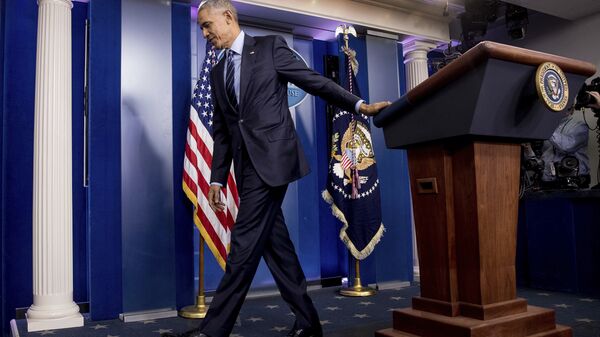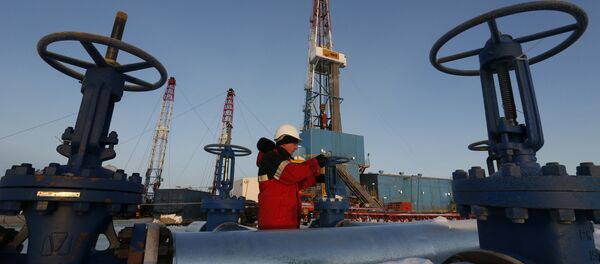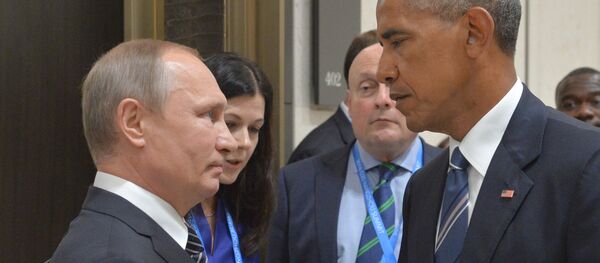"The Russians can't change us or significantly weaken us. They are a smaller country, they are a weaker country, their economy doesn't produce anything that anybody wants to buy except oil and gas and arms," Obama assured the audience, while trying to convince the public that the only threat Russia posed to the United States was an ideological one.
"Smaller" is a very broad classification, and it is unclear by what metric President Obama chose to assign that label. In terms of land mass, Russia is obviously not smaller. With a landmass of over 17 million square km, Russia is almost twice as large as the US, at under 10 million square km. In terms of population, the United States does have Russia beat: 325 million to 146 million people. However, Russia is still in the top-ten worldwide for population and it is difficult to imagine President Obama calling a country like Japan (127 million) or Mexico (122 million) "smaller."
"Weaker" is likely a reference to Russian military strength. The Military Strength Index, created by Swiss multinational firm Credit Suisse, has the United States as the world’s mightiest military power, with a ranking of.94. Russia is in second with.87. However, this ranking has little practical meaning, since the two countries have the largest nuclear arsenals in the world, assuring mutual annihilation in the case of a nuclear military conflict as well as a likely end to the entire planet.
The third part of Obama’s claim is that the only valued Russian exports are hydrocarbons and weapons. Russia is indeed the world’s largest exporter of natural gas, and one of the world’s major oil producers. It is also the second largest arms exporter, after the United States.
However, the myth of Russia producing only energy or raw materials is far from reality. And the US President should know this, since Washington relies on Russia in quite a few areas. For instance, after retiring its Space Shuttle program, NASA became dependent on Roscosmos, the Russian space agency, to send astronauts and supplies to the International Space Station (operated cooperatively by the US and Russia.) The Pentagon also depends on Russian RD-180 space engines to power rockets carrying American military satellites into orbit. The US still cannot produce heavy-lift orbital-launch rocket engines, despite multiple attempts to replace the sturdy Russian reliables with American-made analogs.
Russia is also one of the leading countries in building nuclear power plants around the world, one of the few countries with a massive civilian aircraft industry, and one of the global leaders in education, which every year attracts thousands of students to Russia. The list can go on and on, but how does that matter, if you have such a great talking point.
"Over a third of Republican voters approve of Vladimir Putin, the former head of the KGB. Ronald Reagan would roll over in his grave," Obama opined during the conference, in reference to a poll in The Economist which put Republican approval of Putin at 37 percent.
Russian President Vladimir Putin was never the chief of the KGB. Putin was a member of the Soviet intelligence agency from 1975-1991, resigning when then-KGB chief Vladimir Kryuchkov was one of the key collaborators in the August coup-attempt to seize power from Russia’s first President, Mikhail Gorbachev. President Obama was likely thinking of the FSB, an organization which was the successor of the KGB, but actually created in 1995, several years after the collapse of the Soviet Union. Former President of Russia Boris Yeltsin appointed Putin as the FSB head in 1998, a position that Putin would hold for just over a year before he was promoted to Prime Minister. Among US agencies, FSB corresponds most closely to the FBI. In no sense was Vladimir Putin ever the chief of the KGB.
The highest-ranking official in the United States should have known all this. After all, Obama claims he does not miss security briefings. But, somehow, this is not the first time that President Obama has ignored facts to make a great speech. In May 2014 he called Russia "a regional power" that does not play a major role on the international scene.
"Russia is a regional power that is threatening some of its immediate neighbours, not out of strength but out of weakness," the President said.
The following year the Russian air force began operations in Syria. In the week of December 12 2016, the largest Syrian city of Aleppo was fully recaptured by Russian and Syrian forces. Meanwhile, in an infamous congressional hearing in September 2015, reporting on how a $250 million program was spent on creating a ‘moderate opposition’ within Syria, General Lloyd Austin, commander of US Central Command, admitted only "four or five" US-trained Syrians were still in the fight against Daesh. The chairman of the Senate Armed Services Committee, Senator John McCain, said it was clear that the United States was "losing" against Daesh. This instead of four or five thousand the US was hoping to arm and unleash on Syria. But it's Russia who is weak, right Mr. President?






